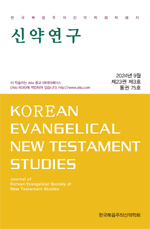- 영문명
- Greco-Roman Moral Philosophy and Paul : On Anger
- 발행기관
- 한국복음주의신약학회
- 저자명
- 박정훈(JungHoon Park)
- 간행물 정보
- 『신약연구』제24권 제2호, 189~227쪽, 전체 39쪽
- 주제분류
- 인문학 > 종교학
- 파일형태
- 발행일자
- 2025.06.30
7,480원
구매일시로부터 72시간 이내에 다운로드 가능합니다.
이 학술논문 정보는 (주)교보문고와 각 발행기관 사이에 저작물 이용 계약이 체결된 것으로, 교보문고를 통해 제공되고 있습니다.

국문 초록
에베소서 4:26a절의 해석은 학자들을 어려움에 빠뜨리는데, 이는다음의 주요한 문제들 때문이다. 1) ὀργίζεσθε καὶ μὴ ἁμαρτάνετε 구절에서 첫 번째 명령법의 용법 결정 문제, 2) καὶ로 이어진 두 명령법의 관계 결정 문제, 3) 31절에서 모든 분노(πᾶσα θυμὸς καὶ ὀργή)를제거하라는 명령과의 조화 문제. 이에 대해서 D. B. 월러스(Wallace) 는 구문 분석을 통하여, 명령법 καὶ 명령법 구조는 일반적으로 명령법을 조건으로 읽는 명령법 καὶ 미래 직설법 구문과 다른 구조이므로, 첫 번째 명령을 조건이나 그 하위구조인 양보로 읽을 수 없고, 여기서 첫 번째 명령법은 단순히 명령으로 해석되어야 하며, 여기서말하는 분노는 일반적인 분노가 아닌 의로운 분노를 뜻한다고 주장한다. 그런데 그의 문법적 해결책은 분노의 구약적 개념을 지지하기위해 끼워 맞춰진 인상을 준다. 이는 월러스의 문법적 선택이 기존의해석적 문제를 해결하지 못할 뿐만 아니라, 더욱 심각한 다음과 같은 문제들을 양산한다는 점에서 분명해진다: 1) 근접 문맥인 31절과 부조화를 해결하지 못하고, 2) 마태복음 5:22에서 예수께서 직접 분노를 금하신 것과도 일치하지 않고, 3) 야고보서 1:19에서 역시 의분을금하는 것과도 일치하지 않는다. 따라서, 본 논문은 본문의 문법적분석을 재시도하여 더 타당한 가능성을 제시하고, 이것이 구절이 주어진 맥락 안에서 조화할 수 있는지 확인하며, 나아가 구약적 배경이아닌 바울 당대의 그리스-로마 도덕철학자인 필로데모스, 세네카, 플루타르코스, 그리고 갈레노스의 글을 통해 분노에 대한 관습적인 논의를 파악하여 이로부터 분노에 대한 당대의 문화적 이해를 서술하고, 이를 통해 본 구절 해석의 타당성을 확보하고자 한다.
영문 초록
Ephesians 4:26a is a crux interpretum for three factors: 1) deciding the use of the first imperative in the Greek phrase ὀργίζεσθε καὶ μὴ ἁμαρτάνετε; 2) deciding the relationship between the two imperatives connected by καὶ; 3) harmonizing 4:26a with 4:31 forbidding all kinds of anger (πᾶσα θυμὸς καὶ ὀργή). D. B. Wallace insisted that one should not read the first imperative as conditional or concessional because 4:26a does not have imperative καὶ future indicative structure which indicates that the first imperative should be read as conditional. Accordingly, one should read the first imperative as a simple command and anger as a righteous anger. However, Wallace's grammatical analysis appears biased and seems to have been manipulated to align with the Old Testament concept of anger. This becomes clear in that his option does not solve existing problems of interpretation and leads to more serious problems as follows: 1) it cannot be harmonized with 4:31 rejecting all kinds of anger; 2) it cannot be harmonized with Jesus’s prohibition of anger in Mattew 5:22; and 3) it cannot be harmonized with James 1:29 forbidding righteous anger. Therefore, the present article reanalyzes the grammar of 4:26a to propose a more appropriate option, confirms that the grammatical option is supported by the context of 4:26a, and ensures the reliability of the interpretation by referring to a conventional treatment of anger analyzed through the treatises on anger by Greco-Roman moral philosophers, namely, Philodemus, Seneca, Plutarch, and Galen.
목차
1. 서론
2. 문법적 논의
3. 분노에 대한 그리스-로마 도덕철학적 이해
4. 결론
참고문헌
키워드
해당간행물 수록 논문
참고문헌
교보eBook 첫 방문을 환영 합니다!

신규가입 혜택 지급이 완료 되었습니다.
바로 사용 가능한 교보e캐시 1,000원 (유효기간 7일)
지금 바로 교보eBook의 다양한 콘텐츠를 이용해 보세요!




